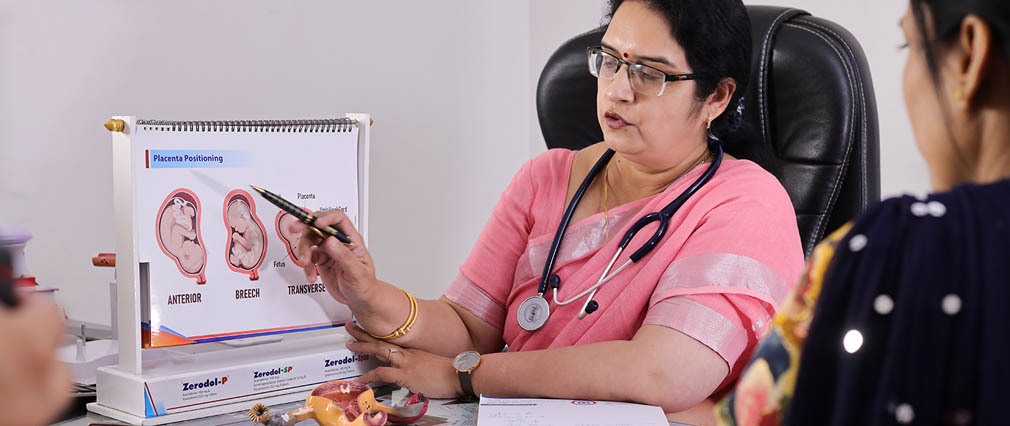
Placenta Previa: Diagnosis and Management at Meerut Gynaecologist
Placenta previa is a condition in which the placenta, a critical organ that nourishes the baby, is abnormally positioned low in the uterus. It either partially or completely covers the cervix, the opening to the birth canal. This condition can lead to complications such as bleeding during pregnancy or delivery, making it a high-risk scenario requiring specialized care. Placenta previa often presents in the second or third trimester and is diagnosed through routine ultrasounds.
Despite its challenges, with timely diagnosis and expert management, women with placenta previa can achieve healthy pregnancy outcomes. At Meerut Gynaecologist, Dr. Deepti Dogra offers advanced care to manage placenta previa effectively, prioritizing the safety of both mother and baby.
Types of Placenta Previa
- Complete Placenta Previa: The placenta fully covers the cervix.
- Partial Placenta Previa: The placenta partially obstructs the cervix.
- Marginal Placenta Previa: The edge of the placenta reaches the cervix without covering it.
- Low-Lying Placenta: The placenta is implanted low in the uterus but does not reach the cervix.
Causes and Risk Factors for Placenta Previa
- Previous cesarean sections or uterine surgeries.
- Multiple pregnancies, leading to an enlarged placenta.
- Advanced maternal age (over 35 years).
- Smoking or substance use during pregnancy.
- History of placenta previa in prior pregnancies.
Symptoms of Placenta Previa
- Painless vaginal bleeding, especially in the second or third trimester.
- Preterm contractions in some cases.
- Signs of fetal distress due to compromised blood flow in severe cases.
Diagnosis and Management by Dr. Deepti Dogra at Meerut Gynaecologist
Dr. Deepti Dogra provides meticulous care in diagnosing and managing placenta previa to minimize risks. Diagnostic methods include:
- Ultrasound: Transabdominal and transvaginal ultrasounds to confirm the position of the placenta.
- Doppler Studies: To assess blood flow and monitor fetal health.
- Regular Monitoring: For low-lying placenta cases that may resolve as the pregnancy progresses.
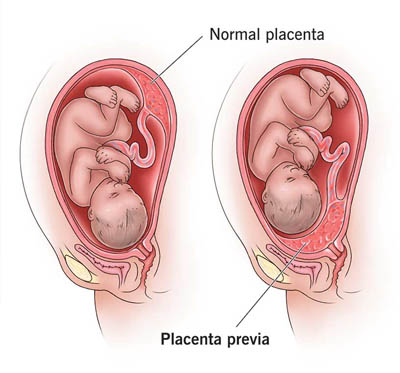
Treatment options include:
1. Activity Modifications:
- Avoiding heavy physical activities or prolonged standing to reduce bleeding risks.
- Complete bed rest in severe cases.
2. Close Monitoring:
- Frequent ultrasounds and fetal monitoring to detect any signs of complications.
3. Medications:
- Corticosteroids to accelerate fetal lung development in case of preterm delivery.
- Medications to manage preterm contractions, if present.
4. Delivery Planning:
- For complete or severe placenta previa, Dr. Dogra recommends planned cesarean delivery to ensure a safe outcome for both mother and baby.
Why Meerut Gynaecologist for Placenta Previa Management?
Dr. Deepti Dogra’s expertise in high-risk pregnancies ensures comprehensive and personalized care for placenta previa cases. At Meerut Gynaecologist, the focus is on continuous monitoring, timely interventions, and patient-centered support to ensure safe delivery outcomes.
Prioritize Your Pregnancy Safety!
If you’ve been diagnosed with placenta previa or are experiencing related symptoms, trust Dr. Deepti Dogra at Meerut Gynaecologist for expert care. Schedule your consultation today and ensure the best possible care for you and your baby!
FAQs for Placenta Previa at Meerut Gynaecologist
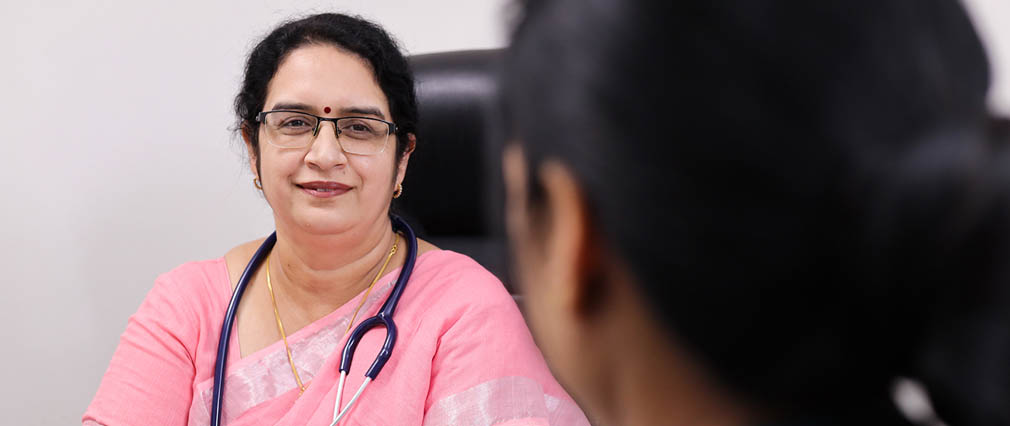
Placenta Accreta: Diagnosis and Management at Meerut Gynaecologist
Placenta accreta is a serious condition in which the placenta abnormally attaches too deeply into the uterine wall. In some cases, it may even invade surrounding tissues, leading to complications during delivery. This condition is classified into three types based on severity: placenta accreta, placenta increta (penetrating into the uterine muscle), and placenta percreta (invading through the uterine wall into nearby organs).
Placenta accreta is a high-risk obstetric condition that can cause life-threatening bleeding during childbirth. However, with timely diagnosis and expert management, complications can be minimized, ensuring a safe outcome for both mother and baby. At Meerut Gynaecologist, Dr. Deepti Dogra specializes in managing placenta accreta with advanced techniques and meticulous care.
Causes and Risk Factors for Placenta Accreta
- Previous Cesarean Sections: The risk increases with the number of prior cesarean deliveries.
- Uterine Surgeries: Procedures like myomectomy or dilation and curettage (D&C).
- Placenta Previa: Placenta accreta is more likely in cases of placenta previa with a history of uterine surgeries.
- Maternal Age: Women over 35 years are at higher risk.
- Other Risk Factors: Multiple pregnancies or uterine abnormalities.
Symptoms of Placenta Accreta
- Often asymptomatic during pregnancy and detected through routine ultrasounds.
- Vaginal bleeding in the third trimester, though not always present.
- Difficulty separating the placenta during delivery, leading to heavy bleeding.
Diagnosis and Management by Dr. Deepti Dogra at Meerut Gynaecologist
Dr. Deepti Dogra uses advanced diagnostic techniques and personalized care plans to manage placenta accreta effectively. Diagnostic methods include:
- Ultrasound Imaging: To identify abnormal placental attachment and invasion.
- MRI Scans: For detailed assessment in complex cases.
- Blood Tests: To monitor for signs of anemia or other complications.
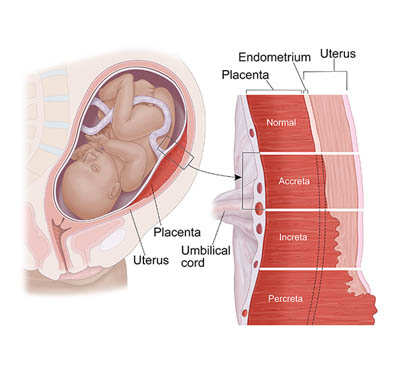
Treatment options include:
1. Delivery Planning:
- A planned cesarean delivery with a multidisciplinary team ensures the safety of the mother and baby.
- In severe cases, delivery is scheduled before term to minimize risks.
2. Hysterectomy:
- For cases of severe invasion (placenta increta or percreta), removal of the uterus may be necessary to control bleeding.
3. Blood Transfusion Support:
- Ensuring adequate blood availability to manage potential hemorrhage during or after delivery.
4. Postpartum Care:
- Comprehensive post-delivery care, including monitoring for infections or other complications.
Why Meerut Gynaecologist for Placenta Accreta Management?
Dr. Deepti Dogra’s expertise in high-risk obstetrics ensures the best possible care for placenta accreta cases. At Meerut Gynaecologist, patients receive personalized treatment plans, compassionate support, and access to advanced facilities, ensuring the safety of both mother and baby.
Prepare for a Safe Delivery with Confidence!
If you’ve been diagnosed with placenta accreta or are at risk, consult Dr. Deepti Dogra at Meerut Gynaecologist for expert care and guidance. Schedule your consultation today and rest assured that you’re in capable hands!
FAQs for Placenta Accreta at Meerut Gynaecologist
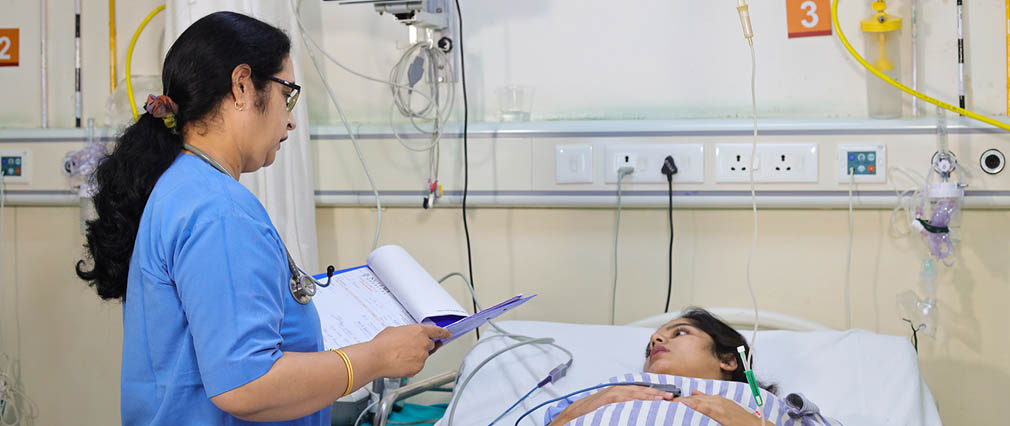
Previous Caesarean Section: Expert Care at Meerut Gynaecologist
A previous caesarean section is a significant consideration in subsequent pregnancies, as it can influence delivery options and potential complications. Women with a history of C-section may face concerns such as uterine rupture, placenta-related issues (e.g., placenta previa or accreta), or difficulties with labor. However, with proper monitoring and expert care, most women can achieve healthy pregnancies and deliveries.
Depending on individual circumstances, a trial of labor after caesarean (TOLAC) or a planned repeat caesarean section (RCS) may be recommended. At Meerut Gynaecologist, Dr. Deepti Dogra provides comprehensive care for women with a history of C-section, ensuring personalized delivery plans and optimal outcomes.
Factors Affecting Delivery Choices After a Previous C-Section
- Uterine Scar Integrity: The type of uterine incision in the prior surgery plays a crucial role in determining the safety of vaginal delivery.
- Interval Between Pregnancies: A shorter gap between pregnancies increases the risk of complications like uterine rupture.
- Complications in Previous Pregnancy: Issues such as placenta previa, preeclampsia, or fetal distress may influence delivery decisions.
- Maternal and Fetal Health: Current pregnancy health and fetal size or position are key considerations.
Risks Associated with a Previous C-Section
- Uterine rupture during labor.
- Placenta accreta or previa in subsequent pregnancies.
- Adhesions (scar tissue) causing complications during repeat surgery.
Delivery Options After a Previous C-Section
1. Trial of Labor After Caesarean (TOLAC):
- Suitable for women with a low transverse uterine scar and no additional risk factors.
- Vaginal Birth After Caesarean (VBAC) may be attempted under close monitoring.
2. Planned Repeat Caesarean Section (RCS):
- Recommended for women with a vertical uterine scar, multiple prior C-sections, or other complications.
- Scheduled delivery ensures safety and reduces risks associated with labor.
Diagnosis and Monitoring by Dr. Deepti Dogra at Meerut Gynaecologist
Dr. Deepti Dogra provides detailed assessments and individualized care for women with previous C-sections. Diagnostic and monitoring steps include:
- Ultrasound and MRI: To assess uterine scar thickness and placental position.
- Fetal Monitoring: Regular ultrasounds to track fetal growth and well-being.
- Risk Assessment: Evaluating maternal and fetal health to determine the safest delivery option.

Why Meerut Gynaecologist for Post-C-Section Care?
Dr. Deepti Dogra’s expertise in high-risk obstetrics ensures that women with previous C-sections receive the best care tailored to their needs. Whether planning a VBAC or a repeat C-section, Meerut Gynaecologist provides advanced facilities, compassionate support, and meticulous monitoring throughout pregnancy and delivery.
Your Safe Delivery Starts Here!
If you’ve had a previous C-section, trust Dr. Deepti Dogra at Meerut Gynaecologist to guide you through a safe and healthy pregnancy journey. Schedule your consultation today and explore delivery options designed for your specific needs!
FAQs for Previous Caesarean Section at Meerut Gynaecologist

Ectopic Pregnancy: Diagnosis and Management at Meerut Gynaecologist
An ectopic pregnancy occurs when a fertilized egg implants outside the uterus, most commonly in one of the fallopian tubes. In rare cases, it may implant in the ovary, cervix, or abdominal cavity. Since the fertilized egg cannot develop properly outside the uterus, an ectopic pregnancy poses serious health risks to the mother, including internal bleeding and organ damage.
Ectopic pregnancy is a medical emergency requiring prompt diagnosis and treatment. At Meerut Gynaecologist, Dr. Deepti Dogra specializes in the timely detection and compassionate management of ectopic pregnancies, ensuring the safety and health of her patients.
Causes and Risk Factors for Ectopic Pregnancy
- Fallopian Tube Damage: Infections, surgeries, or inflammation can hinder the egg’s movement to the uterus.
- Hormonal Imbalances: Disruptions in hormones can affect the egg’s ability to travel through the fallopian tubes.
2. Intrauterine Fetal Deaths (IUFD)
- Previous ectopic pregnancy.
- Pelvic inflammatory disease (PID).
- History of infertility treatments or tubal surgeries.
- Other Factors: Smoking, advancing maternal age, or the use of intrauterine devices (IUDs).
Symptoms of Ectopic Pregnancy
- Sharp or stabbing pelvic or abdominal pain, often localized to one side.
- Vaginal bleeding or spotting.
- Shoulder pain or lightheadedness, indicating potential internal bleeding.
- Missed period accompanied by severe discomfort.
Diagnosis and Management by Dr. Deepti Dogra at Meerut Gynaecologist
Dr. Deepti Dogra uses advanced diagnostic tools and a patient-centered approach to manage ectopic pregnancies effectively. Diagnostic steps include:
- Pelvic Ultrasound: Transvaginal imaging to locate the pregnancy and confirm ectopic implantation.
- Blood Tests: Measuring hCG (human chorionic gonadotropin) levels, which may rise abnormally in ectopic pregnancies.
- Clinical Examination: Assessing for signs of internal bleeding or rupture.
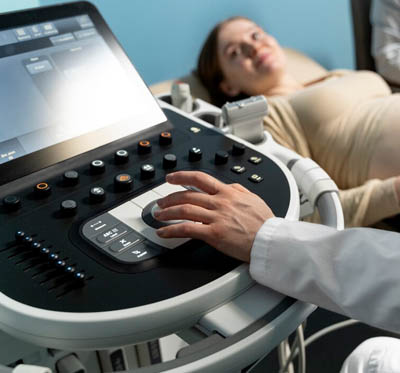
Treatment options include:
1. Medications:
- Methotrexate: A non-surgical option that stops cell growth and dissolves the ectopic tissue, suitable for early and unruptured ectopic pregnancies.
2. Surgical Intervention:
- Laparoscopic Surgery: Dr. Dogra specializes in minimally invasive procedures to remove the ectopic pregnancy and repair or remove the affected fallopian tube.
- Emergency Surgery: For ruptured ectopic pregnancies, immediate surgery is performed to control bleeding and stabilize the patient.
3. Post-Treatment Care:
- Monitoring hCG levels to ensure complete resolution.
- Counseling for future pregnancies and potential risk reduction strategies.
Why Meerut Gynaecologist for Ectopic Pregnancy Management?
Dr. Deepti Dogra’s expertise in handling high-risk obstetric conditions ensures effective and compassionate care for ectopic pregnancies. At Meerut Gynaecologist, patients receive personalized treatment plans, advanced surgical options, and emotional support during challenging times.
Your Health is Our Priority!
If you suspect an ectopic pregnancy or experience any concerning symptoms, consult Dr. Deepti Dogra at Meerut Gynaecologist immediately. Schedule your consultation today to ensure timely diagnosis, expert care, and a safe path forward!


